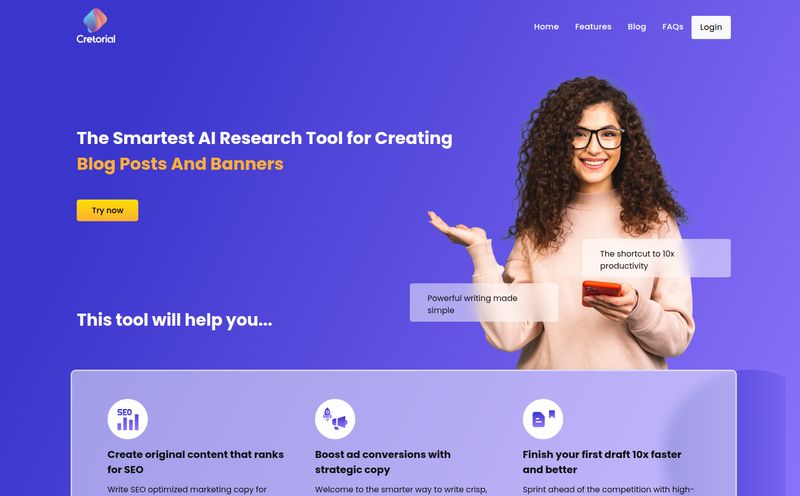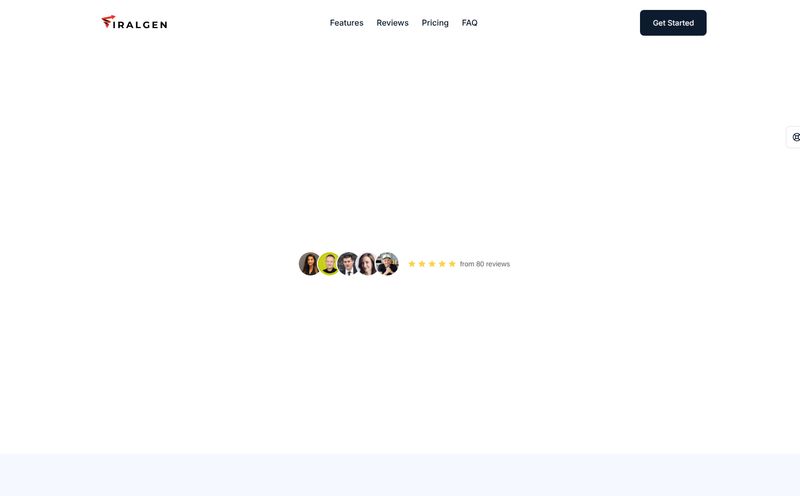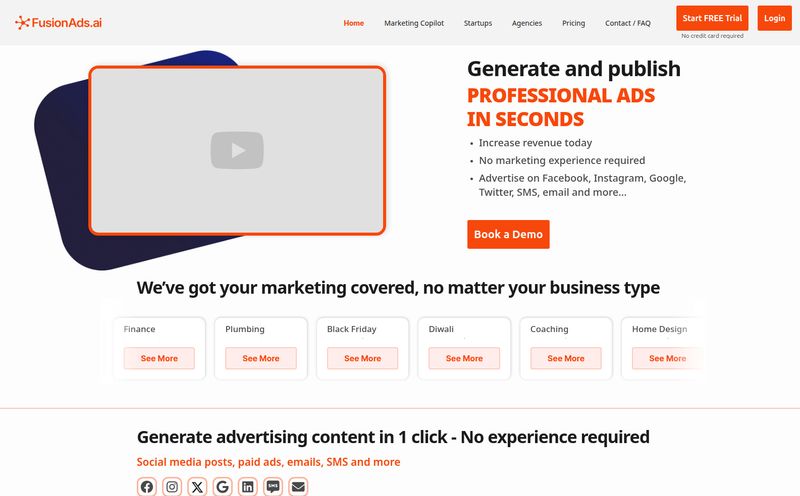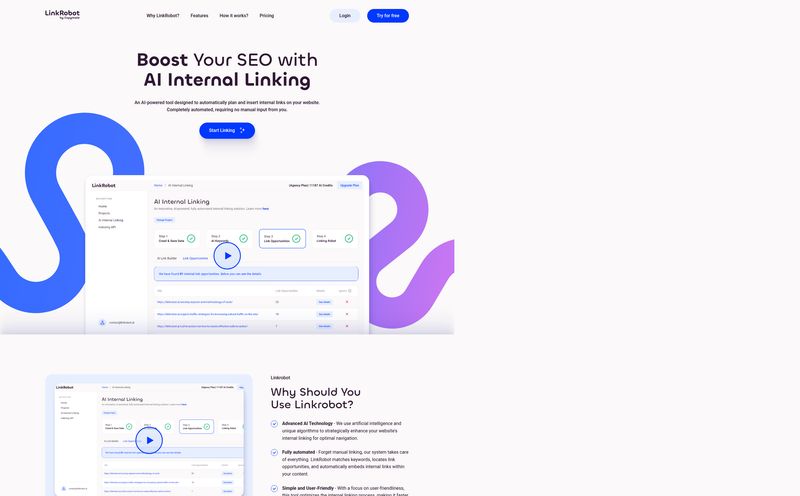We've all been there. Staring at that blinking cursor on a blank page. The deadline is looming, the coffee's gone cold, and your brain feels like it’s running on fumes. As someone who’s been wrestling with content, SEO, and traffic for years, that feeling is an old, unwelcome friend. The demand for more content, better content, is relentless.
Then, the AI content explosion happened. Suddenly, platforms like Jasper and Copy.ai were everywhere, promising to solve all our problems. And they're good! But sometimes they can feel like using a firehose to water a houseplant. That’s why my curiosity was piqued when I stumbled upon Everyday AI Tools. It seemed... different. More focused. So, I decided to take it for a spin and see if it could actually make my day-to-day grind a little easier. Is it the real deal or just another drop in the AI ocean? Let's get into it.
">
What Exactly Is Everyday AI Tools?
At its heart, Everyday AI Tools is a web application that uses OpenAI’s GPT-4 Turbo model to generate text. But unlike a general-purpose chatbot, it’s not a blank slate. Instead, it’s more like a Swiss Army knife. You don't get one big blade; you get a collection of specific, purpose-built tools designed for common tasks that business owners, marketers, and office workers face. You know, the stuff that eats up all your time.
Think of it this way: ChatGPT is a brilliant, open-ended conversation partner. Everyday AI Tools is more like a team of specialized assistants. One is an expert at writing cover letters, another whips up social media posts, and a third can outline your next blog post. It's built on the idea of providing targeted solutions, fast. No messing around with complex prompts, just pick your tool, give it some basic info, and go.
A Look Under the Hood at the AI Generation Tools
So what's actually in this digital toolbox? The platform organizes its features into a handful of neat categories. I spent some time playing around with most of them, and a few definitly stood out.
For the Content Creators and Marketers
This is my home turf, so I was most critical here. The suite includes an Article Intro generator, an SEO Content Optimizer, Social Media Post writer, and a Marketing Email tool. The Article Intro tool is surprisingly effective at kicking off writer's block. You give it a topic, and it spits out a few engaging hooks. Not always perfect, but it's a fantastic starting point.
The SEO Content Optimizer is interesting. It's not going to replace a full-blown platform like SurferSEO or Clearscope, let's be clear. But for generating ideas on how to incorporate topics and angles from competitors, it’s a handy brainstorming partner. It helps you think about what you might be missing in your content briefs.
For the Job Seekers and Professionals
This, I think, is where Everyday AI Tools might have found its killer app. Writing about yourself is hard. It's awkward. The platform offers tools for crafting a Cover Letter, a LinkedIn About Me section, and even a Recruiter Response. I fed it a generic job description and some notes about my 'experience', and the cover letter it produced was... impressively solid. It was professional, well-structured, and needed only minor tweaks to feel personal. For anyone who dreads the job application process, this could be a massive confidence booster.
And All the Other Handy Gadgets
Beyond those core areas, there are other niche tools like a Book Review generator, an Essay Outliner, and even a Movie Script tool. I'm probably not going to be penning the next big blockbuster, but the Essay Outliner is genuinely useful for structuring any long-form piece of content, not just academic papers. It’s these little extras that make the platform feel robust.
The Real-World Benefits I Actually Noticed
It’s one thing to list features, it's another to see how they hold up in a real workflow. The biggest benefit for me was sheer speed. It's like having a hyper-caffeinated intern who's great at producing first drafts. It doesn't do my job for me, but it cuts the time it takes to get started by more than half. That initial, painful 'blank page' phase is just... gone.
The quality is there, too. Because it’s running on GPT-4 Turbo, the outputs are coherent, contextually aware, and generally well-written. You can tell it’s a step above some of the clunkier, older AI models that are still floating around on other platforms.
">
Let's Talk Money: The Pricing Structure
Okay, the part everyone's waiting for. How much does it cost? This is another area where Everyday AI Tools takes a different path. Instead of a recurring monthly subscription, they offer one-time purchase packages based on the number of 'responses' (i.e., content generations) you get.
I’ve put together a quick table to break it down:
| Package Name | Number of Responses | Price | Approx. Cost Per Response |
|---|---|---|---|
| Basic Package | 250 | $49.99 | ~$0.20 |
| Silver Package | 500 | $74.99 | ~$0.15 |
| Gold Package | 1000 | $99.99 | ~$0.10 |
Honestly? I kinda like this model. I have subscriptions I’ve completely forgotten about, and this approach avoids that dreaded subscription fatigue. If you only need AI writing help for a specific project or have sporadic needs throughout the year, paying once and using your credits as you go makes a lot of sense. Plus, they offer a free 3-day trial, so you can test the waters before committing.
The Not-So-Perfect Parts
No tool is perfect, right? The biggest potential downside is the flip side of its pricing model: you can run out of responses. If you're a power user generating content all day, every day, you could burn through a Gold package pretty quickly. When you run out, you have to buy another package. This could be more costly in the long run than an unlimited monthly plan from a competitor for very heavy users.
Also, the specificity of the tools is both a strength and a weakness. If you need to write a social media post, the tool is great. But if you have a unique, multi-step content task that doesn't fit into one of their pre-made boxes, you might find a more open-ended tool like ChatGPT more flexible.
">
Who Is Everyday AI Tools Really For?
After kicking the tires, I have a pretty clear picture of the ideal user.
- The Busy Professional or Job Seeker: Someone who needs to quickly draft a polished cover letter, update their LinkedIn profile, or respond to recruiters without spending hours agonizing over every word.
- The Small Business Owner: The person wearing all the hats, who needs to write marketing emails, product descriptions, and social media updates but doesn't have a dedicated marketing team.
- The Occasional Content Creator: A blogger or freelancer who needs a creative boost to overcome writer's block but doesn't need an enterprise-level, all-you-can-eat AI subscription.
Who is it not for? Probably the full-time content agency or the power blogger who needs to produce enormous volumes of text daily. The per-response model might become less economical at that scale.
Frequently Asked Questions (The Stuff You're Probably Wondering)
- 1. Is the content from Everyday AI Tools unique and plagiarism-free?
- In my experience, yes. Since it's powered by GPT-4, it generates new text for each request. However, as with any AI tool, I always recommend running critical pieces through a plagiarism checker and, more importantly, adding your own voice and facts to make it truly yours.
- 2. Can I really use this for my SEO content?
- You can use it as a fantastic starting point. The intro generator and outliner are great for structure. But for a piece to rank well, it still needs human expertise, original insights, and a unique perspective. Think of it as an assistant, not a replacement for a skilled SEO writer.
- 3. What's the difference between this and just using ChatGPT?
- Convenience and focus. With ChatGPT, you have to craft the perfect prompt. With Everyday AI Tools, the prompt engineering is basically done for you. You just fill in a few fields and click a button. It's faster for these specific, repetitive tasks.
- 4. Is the one-time payment really a one-time payment?
- Yes, for that block of responses. There's no recurring charge. When you run out of responses, you can choose to buy another package or not. No sneaky rebills.
- 5. How good is the 'SEO Content Optimizer' tool?
- It's a solid idea-generator. It helps you see what topics and keywords your competitors are using. It won't give you the deep data-driven analysis of a specialized SEO tool, but it's great for a quick competitive pulse-check.
- 6. What if I use up all my responses in the first week?
- Then you'd need to purchase a new package. This is the trade-off of the pay-as-you-go model. It's fantastic for moderate users but could get pricey for extremely high-volume users.
My Final Verdict
So, is Everyday AI Tools worth it? For its target audience, I'd say a resounding yes. It's not trying to be the biggest or most complex AI writer on the market. Instead, it’s a practical, well-designed set of tools that solves common, everyday content problems efficiently.
I’m particularly impressed by the one-time purchase model, which feels like a breath of fresh air in a world saturated with subscriptions. If you're a professional, a small business owner, or a content creator looking for a reliable AI assistant without the monthly commitment, this is a tool you should seriously consider. Give the free trial a spin. You've got nothing to lose but that dreaded blinking cursor.



